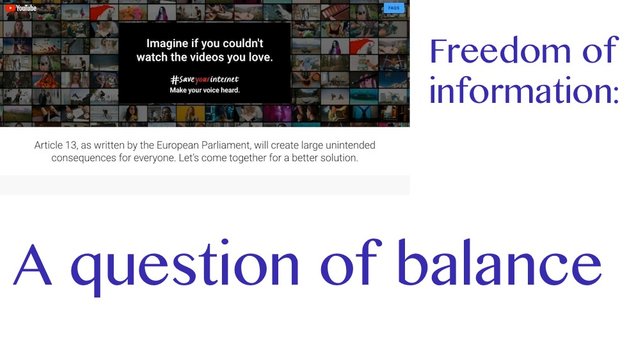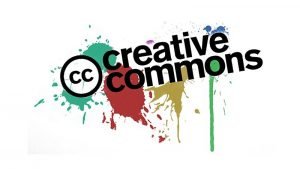
This is in response to the #freedomfriday and #informationwar collaborative challenge set by @eaglespirit in this post.
When you see YouTube spearheading a major campaign against an EU directive on copyright, it gives you pause for thought.
Is this the same YouTube that promotes the videos of major TV channels, while low-budget channels that are not considered "advertiser-friendly" are lost to the algorithms?
YouTube's action has re-opened an intense debate on the issue of copyright law.
The proposals in question form part of Article 13 of the EU's Directive on Copyright In the Digital Single Market. They are set forth in such ambiguous language that almost anything could be read into them, but the general gist is that platforms that host creative works are instructed to ensure that the rights of copyright holders are not violated by the works uploaded to their platforms.
The actual penalties for violations of the directive are to be outlined by individual EU member states.
YouTube argues that the measures might make it necessary for the platform to ban certain videos to European viewers in EU member states. The bans could cover videos showing news clips, music or excerpts of films or TV shows – unless they are explicitly hosted by the copyright holders.
And as licensing rights are often held by large corporate entities, it has been argued that this will effectively censor small freelance publishers who use video clips and memes in their work.
Detractors say these are exaggerated scare tactics.
We will find out when the measures come into effect, probably in January 2019, and are then passed into law in the individual member states.
How will these measures affect Steemit?
Copyright law becomes even more tricky on a decentralised platform built on a blockchain. Videos hosted on the platform can be removed, and the "information society service provider" mentioned in the Directive would be the platform that the video is uploaded to before it's embedded in the post.
Copyright law is a minefield. It's full of grey areas, like the US "fair use" amendment that allows limited use of copyrighted material in certain situations. The legislation varies from country to country and is not always clear-cut, so if you're a writer, website editor or a video producer and you use work that is publicly available, you can't always be certain that someone will not try to sue you.
This is not scare-mongering. When I ran a small business a few years ago, I had an online shop, and the website hosting platform I used had an online forum. From time to time I would see comments on that forum from other online shop owners who had used an image from one of the big photo agencies on their websites without paying, and were now being threatened with legal action – sometimes in the region of tens of thousands of pounds.
Surely artists have a right to have their work protected?
This is not always about protection of the artists who created the photo or artwork. Copyright can be purchased. British Pathé has newsreels dating back to 1910 which can be viewed on its YouTube channel, but if you want to use excerpts of these in your own work, you have to pay a licensing fee to the company that currently owns the newsreels – even if the original creators of the films are long dead.

Source This photo, from Aloahwild, showing people posing with a captured tank during the First World War, is shared under a Creative Commons ShareAlike licence. However many vintage photos are held under copyright purchased by new owners, despite being over 100 years old.
Sometimes licence holders hide the work they own behind a paywall, so that even links to it are not allowed. I ran into this issue recently when I was writing a post on Five from the Early 70s. I wanted to include a link to the 1972 hit Son of my Father, by Chicory Tip. But all the original videos showing the group playing the song had been blacked out on YouTube, with a notice saying that it was on the instructions of the copyright holder, BR Music.
BR Music's website states:
BR MUSIC, founded January 1st 1983 by Bert van Breda, controls over 1400 original masters from the 60’s through the 90’s, available for licensing worldwide for compilations, films, commercials, tv-series etc.The videos are now available on YouTube, so the firm has apparently changed its policy. However, it shows how copyright law can be used to generate income for people who had nothing to do with creating the original work.
I ran into a similar situation recently when I was making an informative video for a previous FreedomFriday challenge, about the African tribal chief and political leader Seretse Khama, who was exiled from his native country by the British colonial authorities due to his marriage to a white British woman, Ruth Williams.
Almost all the photos and films of Khama and his wife were licensed by the major photo agencies, even though it was 70 years since their story had hit the headlines. It left me very little material to work with.
Artists often sign their rights away
I started my career as a magazine journalist in the late 1980s. In 1987 I had a full-time job writing for a teenage magazine, and I remember being asked for permission for a photo story I'd written to be syndicated (in other words, licensed for another company to publish). I happily agreed, and it didn't even occur to me to ask for a share of the licensing fee!

Source
However a few years later, when I was working in London, new contracts started coming in which stated that copyright was held by the publishing company, and not by the journalists or designers who produced the work. If journalists refused to sign these contracts, their career progress would probably not be that great, as in journalism there's always someone eager to take your place.
I remember at the time that few people did more than "tut tut" and shake their heads as they signed. It's probably no coincidence that I started freelancing around that time, although I went back to full-time work later.
There is a solution!
The digital age offers an increasing number of ways for artists to protect their own work – and for them to release it into the public domain if they so choose. There are countless stories of pop stars from the 1960s signing away their rights, and ending up broke once their brief time in the limelight had expired, while their managers made fortunes from their work.
There are many musicians who still feel they are getting a raw deal, but the digital age at least offers people more options over their own work.

Image by Cinthia Cypriano.
Creative Commons offers artists various licensing options, including Attribution, ShareAlike or NonCommercial, or you may choose to waive your rights altogether and place your work in the public domain. It means that others can use your work, while preventing it being licensed by another entity for profit. It also makes the licensing clear, whatever country you live in.
The more work that "citizen journalists" and artists put out there in the public domain, or under ShareAlike or Attribution licenses, the more material there will be for information producers to use without having to pay hefty licensing fees, or running the risk of being sued.
Artists and producers could still use more restrictive licensing for work that they have spent a lot of time over, or want to sell, while making other types of work available for public use. I uploaded some photos to an online sharing database, for example, making them publicly available. If I wanted to sell any of my photos, I could put a restrictive licence on those particular ones.
Videos can be encrypted to prevent people copying them and making money from them. Alternatively, you might want to make some video footage publicly available by uploading it to a video-sharing website.
Copyright law is a complex subject with many grey areas, and it's those grey areas that can potentially lead to abuses and restrictions of freedom of information. I think the best way round it at the current time is for more content creators to make the licensing of their content clear and explicit, and Creative Commons offers a great way to do this.
Photo credits
Creative Commons image source
Posted from my blog with SteemPress : http://ramblingandscrambling.co.uk/information-war/freedomfriday-could-copyright-law-restrict-freedom-of-information/

.gif)

Great write-up! This is definitely something that worries me, we will have to see if the opponents of article 13 have exaggerated. I think most of the criticism is going to end up being true though.
Also great that you've mentioned Creative Commons, more people should definitely use that to publish their content under!
Downvoting a post can decrease pending rewards and make it less visible. Common reasons:
Submit
Thanks @daan - really glad you liked my post. It all seems open to interpretation now - how each member state interprets the directive and how much lobbying power their rights holders and corporates have with the governments.
Downvoting a post can decrease pending rewards and make it less visible. Common reasons:
Submit
Curated for #informationwar (by @thoughts-in-time)
Our purpose is to encourage posts discussing Information War, Propaganda, Disinformation and other false narratives. We currently have over 9,500 Steem Power and 40+ people following the curation trail to support our mission.
Join our discord and chat with 250+ fellow Informationwar Activists.
Join our brand new reddit! and start sharing your Steemit posts directly to The_IW, via the share button on your Steemit post!!!
Connect with fellow Informationwar writers in our Roll Call! InformationWar - Leadership/Contributing Writers/Supporters: Roll Call
Ways you can help the @informationwar
Downvoting a post can decrease pending rewards and make it less visible. Common reasons:
Submit
Congratulations! This post has been chosen as one of the daily Whistle Stops for The STEEM Engine!
You can see your post's place along the track here: The Daily Whistle Stops, Issue 320 (11/23/18)
Downvoting a post can decrease pending rewards and make it less visible. Common reasons:
Submit
Sounds like a real mess fixin to take place over in the EU. Thanks for bringing us up to speed on it.
Downvoting a post can decrease pending rewards and make it less visible. Common reasons:
Submit
Never was a truer word said!
Downvoting a post can decrease pending rewards and make it less visible. Common reasons:
Submit
I have a habit of speaking the truth, that is why I would never make it as politician.
Downvoting a post can decrease pending rewards and make it less visible. Common reasons:
Submit
Yup - that's also the sad truth.
Downvoting a post can decrease pending rewards and make it less visible. Common reasons:
Submit
Downvoting a post can decrease pending rewards and make it less visible. Common reasons:
Submit